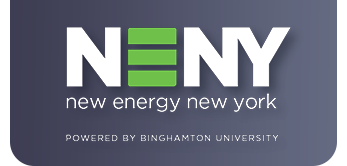Fermi Energy offers a big boost for U.S.-made EV batteries
By Jonathan Everitt
Current electric vehicles depend on batteries that are expensive to produce and lack efficient infrastructure in the U.S. But breakthrough technology from Fermi Energy, Inc. can cut the cost of cathodes by up to 50% and deliver a needed boost to the U.S. electric vehicle supply chain. The company’s participation in New Energy New York’s ChargeUp program — the nation’s first battery-focused business accelerator — is making this leap forward possible.

Based in Blacksburg, Va., Fermi Energy was founded by two battery scientists, Feng Lin and Ray Xu, who invented a revolutionary technology that enables large-scale production of low-cost, sustainable cathodes. The two founders met at Virginia Polytechnic Institute and State University (Virginia Tech) while Xu was working on his doctoral program. Lin was his faculty advisor, who earned his Ph.D. in materials science at the Colorado School of Mines.
During his Ph.D. program, Xu interned at a major electric vehicle manufacturer, where he evaluated materials from different companies worldwide.
“Many of the materials were very good, but there was one challenge in terms of manufacturing: There were no materials in this space being made in the U.S., and certain tax credits required those materials to be American-made,” Xu says.
Xu and Lin teamed up to study different materials that could be made in the U.S. and found some with great potential. Ultimately, they started Fermi to commercialize those materials for U.S. production.
“I talked to Feng about starting the company and within five minutes, he was on board. He had actually raised the idea of starting a company earlier, about a month before my dissertation defense,” Xu says. “We were talking and he asked, ‘Do you want to start a company?’ I said, ‘Are you serious?’ And he said, ‘Yes.’”
A month later, they launched the company with their own money.
A need for business expertise
Coming from a university background, both scientists had the knowledge and the spark of an idea needed for an entrepreneurial venture, but there was something missing: business mentorship.
“We’re technical founders. We have less experience in the business development side,” Xu says. “How do you pitch investors? How do you market the company?”
That’s where ChargeUp came in.
Connecting with ChargeUp
Xu and Lin learned about the ChargeUp accelerator from a colleague of Lin, M. Stanley Whittingham, Nobel laureate and distinguished professor of chemistry at Binghamton University. The program sounded like an ideal match for their work. The partners especially liked what they heard about leading experts in the battery industry serving as mentors in the program.
“ChargeUp created connections for us through other battery manufacturers in New York State and other providers. It connected the dots so we could access the resources we needed to grow our company,” Xu says.
Xu and Lin joined the ChargeUp cohort in spring 2024 and began traveling monthly to Binghamton from Virginia to spend a week at a time on site with the ChargeUp program. From attending industry conferences to meeting with business mentors to learning how to hone their marketing efforts and their investor pitch, those weeks proved invaluable. In between, they would attend virtual sessions and do their homework, making use of their entire time in the program, even long distance.
A wealth of new knowledge
The roughly six-month program packed a lot of insight and new tools into it — and the Fermi team sees a dramatic difference between where they were and where they are today.
“When we joined ChargeUp, we were heavily focused on the technology and not the commercial potential — not even our pitch deck,” Xu says. “ChargeUp helped us get into the mindset of the business side, not just the technology. We learned how to connect with mentors.”
But mentorship was only part of the benefit.
“We also grew on the technology side through our connections with potential customers. We got to meet with people and ask them what they need and what the selling process looks like,” Xu says.
Those conversations have helped Fermi cultivate its first customers. While Fermi is still deep in R&D and working on addressing challenges, it has produced a minimum viable product it can offer its first customers and is currently shipping out materials for customer evaluation purposes.
“We’re already in talks with some large-size battery manufacturers and we’ve signed NDAs with them,” Xu says.
The company has also talked with potential customers in the defense and aerospace industries.
But customers want to evaluate their materials at a larger scale, so the company is working on ramping up production. To that end, the company has recently launched a new project through U.S. Department of Energy to scale up production — a three-year project that should lead to Fermi supplying large customers with materials for evaluation. The DOE will help fund labor, equipment and other resources to scale up production.
Fermi has also secured grant money to fund hiring senior engineers to join the team. It’s in talks to secure pre-seed funding of $2.5 million. But while it has attracted several funders, it continues the search for a lead investor.
A vigorous endorsement for ChargeUp
Xu says he and Lin have been thrilled with the results of their work with ChargeUp, and he’s encouraged peers to consider the program, too — as long as they’re willing to do the work.
“When I talk to colleagues at fellow battery startup companies about ChargeUp, I tell them it’s labor-intensive — you really have to show up and do your homework — but the payback is worth it,” Xu says. “I learned so much through this opportunity.”





